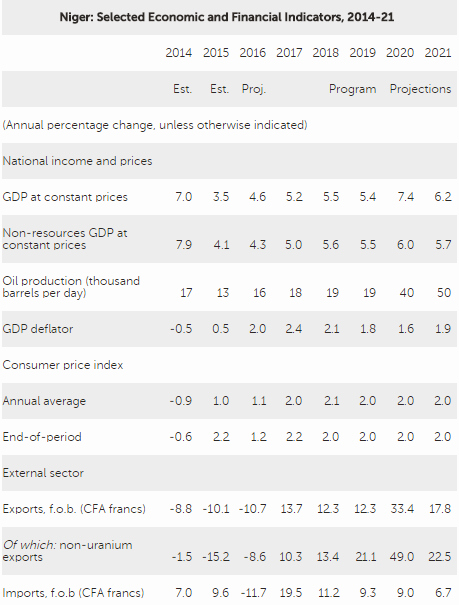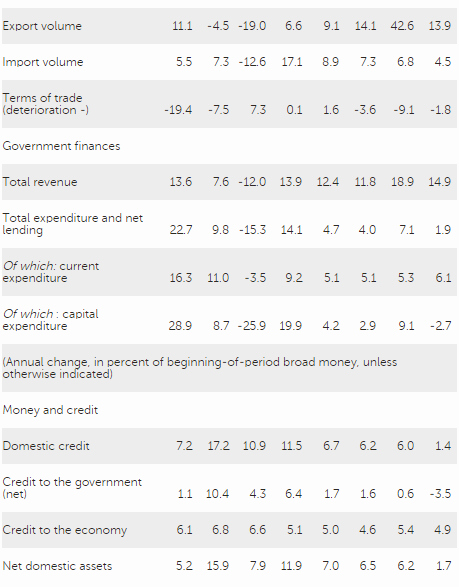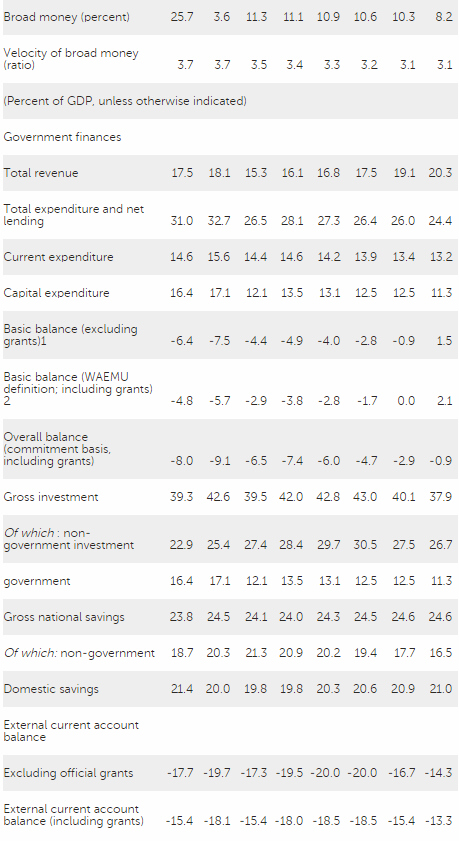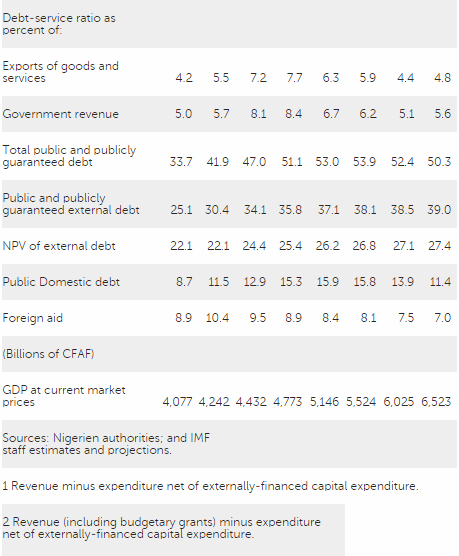IMF Executive Board Approves US$134.04 Million under the ECF Arrangement for Niger
● Niger has been able to maintain macroeconomic stability despite major security challenges, continued low oil and uranium prices, and regional economic slowdown
● The new Arrangement under the ECF aims to sustain macroeconomic stability, make growth more inclusive, and reduce poverty
● To address the persisting challenges and risks, policy priorities ahead need to focus on preserving fiscal and debt sustainability
On January 23, 2017 the Executive Board of the International Monetary Fund (IMF) approved a three-year arrangement under the Extended Credit Facility (ECF) for Niger for an amount equivalent to SDR 98.7 million (about US$134.04 million, or 75 percent of Niger’s quota) in support of the authorities’ national plan for economic development.
The new program aims to enhance macroeconomic stability and foster high and equitable growth, boost incomes and create jobs, while strengthening the foundations for sustainable development. The program will build on the lessons from the previous ECF arrangements. The Executive Board’s decision will enable an immediate disbursement of SDR 14.1 million (about US$19.15 million). The remaining amounts will be phased over the duration of the program, subject to semi-annual reviews.
During the same meeting, the Board also concluded the 2016 Article IV consultation. A separate press release will be issued shortly.
Following the Executive Board discussion on Niger, Deputy Managing Director Mr. Mitsuhiro Furusawa, and Acting Chair, said:
“Niger has been able to maintain macroeconomic stability despite major security challenges, continued low oil and uranium prices, and regional economic slowdown. Growth has improved and inflation remains subdued, well below the WAEMU convergence criterion. Significant progress was made under the 2012-16 Extended Credit Facility (ECF) Arrangement, including in strengthening public financial management, debt management and deepening the financial sector, but the impact of the adverse shocks, policy slippages and weak capacity limited the improvement in broader development indicators. Niger remains one of the least developed countries with numerous social and development challenges.
“The new Arrangement under the ECF aims to sustain macroeconomic stability, make growth more inclusive, and reduce poverty, in line with the government’s strategy as laid out in the Economic Development Document. Specific focus is given to enhancing fiscal space and further improving public financial management and the efficiency of spending to facilitate the attainment of Niger’s development goals, in particular to finance infrastructure and social spending.
“The medium-term economic outlook is favorable, underpinned by improved agricultural production and a pick-up in natural resource exports. Nevertheless, to address the persisting challenges and risks, policy priorities ahead need to focus on preserving fiscal and debt sustainability. A strong reform agenda anchored on more efficient investment, improved business climate, more inclusive financial development, and a comprehensive strategy for addressing gender issues as well as harnessing the demographic dividend will be critical.”
***********************************************************
Recent Economic Developments
Niger’s overall macroeconomic performance has remained satisfactory in 2016, despite the security and humanitarian shocks, the unfavorable commodity prices, and the reduction of trade flows to neighboring countries. Growth is projected to increase to 4.6 percent in 2016 from 3.5 percent in 2015, helped by a strong 2016-17 crop year and despite continued weakness in the oil and mining sectors. Inflation would be contained at 1.1 percent in 2016.
Budget execution has been impacted by lower-than-targeted revenue collection partly due to unfavorable developments in commodity sectors and continued economic problems in neighboring countries. At end-June 2016, most fiscal targets other than for government revenue were however met. Progress was made in implementing structural reforms, albeit with delays.
In response to a larger shortfall of revenue collection in the second half of 2016, the authorities curtailed commitments on nonpriority expenditures for the last quarter of 2016. This measure enacted by the inter-ministerial budget regulation committee will help avoid the accumulation of payments arrears and the resort to domestic financing.
The economic outlook for the medium-term is favorable, but remains subject to substantial external and domestic risks. Real GDP growth is projected to increase to 5.2 percent in 2017, driven by agriculture and an expected pick-up in oil production. Inflation is expected to remain contained below 2 percent. Real GDP growth is expected to average 6.1 percent during 2018-21, mainly as a result of the expansion of the extractive industries sector and an increase in public and private investments. Inflation is expected to remain below the 3 percent West African Economic Monetary Union (WAEMU) convergence criterion. Key risks include negative externalities of regional conflicts, vulnerability to natural disasters, and the economic turmoil in the sub-region.
Program Summary
Building on progress made under previous arrangements (see Press Release No. 12/90) , the new three-year program will support the broad objectives of the Economic Development Document and address impediments to enhanced macroeconomic stability, higher growth and job creation. The main objectives of the ECF-supported program are to maintain macroeconomic stability while creating fiscal space for infrastructure, accommodating permanently elevated security spending, and enhancing social spending. Preserving macroeconomic stability remains essential for attaining policy objectives aimed at reducing poverty, together with an improved business climate and enhanced financial access, all of which would contribute to the diversification of the economy and its enhanced resilience.
Fiscal policies will aim at broadening the tax base—to reduce dependence on volatile natural resource revenues—strengthening the efficiency of tax and customs administration, and improving tax collection. Expenditure management will focus on prioritizing public spending and enhancing expenditure control, including through the full implementation of the Treasury Single Account (TSA) helped by a strong framework for liquidity management to prevent domestic arrears accumulation and contain rising debt levels.




Source: International Monetary Fund
- 291 reads
Human Rights
Fostering a More Humane World: The 28th Eurasian Economic Summi

Conscience, Hope, and Action: Keys to Global Peace and Sustainability

Ringing FOWPAL’s Peace Bell for the World:Nobel Peace Prize Laureates’ Visions and Actions

Protecting the World’s Cultural Diversity for a Sustainable Future

Puppet Show I International Friendship Day 2020

